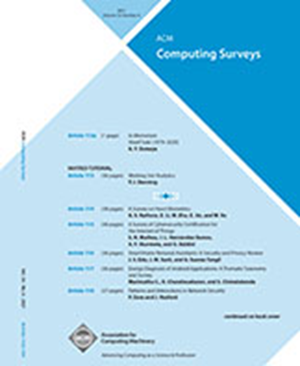LLMs in Software Security: A Survey of Vulnerability Detection Techniques and Insights
IF 28
1区 计算机科学
Q1 COMPUTER SCIENCE, THEORY & METHODS
引用次数: 0
Abstract
Large Language Models (LLMs) are emerging as transformative tools for software vulnerability detection. Traditional methods, including static and dynamic analysis, face limitations in efficiency, false-positive rates, and scalability with modern software complexity. Through code structure analysis, pattern identification, and repair suggestion generation, LLMs demonstrate a novel approach to vulnerability mitigation. This survey examines LLMs in vulnerability detection, analyzing problem formulation, model selection, application methodologies, datasets, and evaluation metrics. We investigate current research challenges, emphasizing cross-language detection, multimodal integration, and repository-level analysis. Based on our findings, we propose solutions addressing dataset scalability, model interpretability, and low-resource scenarios. Our contributions include: (1) a systematic analysis of LLM applications in vulnerability detection; (2) a unified framework examining patterns and variations across studies; and (3) identification of key challenges and research directions. This work advances the understanding of LLM-based vulnerability detection. The latest findings are maintained at https://github.com/OwenSanzas/LLM-For-Vulnerability-Detection软件安全法学硕士:漏洞检测技术和见解的调查
大型语言模型(llm)正在成为软件漏洞检测的变革性工具。传统的方法,包括静态和动态分析,在效率、误报率和现代软件复杂性的可扩展性方面面临限制。通过代码结构分析、模式识别和修复建议生成,llm展示了一种缓解漏洞的新方法。本调查考察了法学硕士在漏洞检测、分析问题表述、模型选择、应用方法、数据集和评估指标方面的研究。我们调查了当前的研究挑战,强调跨语言检测,多模态集成和存储库级分析。基于我们的发现,我们提出了解决数据集可扩展性、模型可解释性和低资源场景的解决方案。我们的贡献包括:(1)系统分析了LLM在漏洞检测中的应用;(2)一个统一的框架来检查不同研究的模式和差异;(3)确定关键挑战和研究方向。这项工作促进了对基于llm的漏洞检测的理解。最新的研究结果保存在https://github.com/OwenSanzas/LLM-For-Vulnerability-Detection
本文章由计算机程序翻译,如有差异,请以英文原文为准。
求助全文
约1分钟内获得全文
求助全文
来源期刊

ACM Computing Surveys
工程技术-计算机:理论方法
CiteScore
33.20
自引率
0.60%
发文量
372
审稿时长
12 months
期刊介绍:
ACM Computing Surveys is an academic journal that focuses on publishing surveys and tutorials on various areas of computing research and practice. The journal aims to provide comprehensive and easily understandable articles that guide readers through the literature and help them understand topics outside their specialties. In terms of impact, CSUR has a high reputation with a 2022 Impact Factor of 16.6. It is ranked 3rd out of 111 journals in the field of Computer Science Theory & Methods.
ACM Computing Surveys is indexed and abstracted in various services, including AI2 Semantic Scholar, Baidu, Clarivate/ISI: JCR, CNKI, DeepDyve, DTU, EBSCO: EDS/HOST, and IET Inspec, among others.
 求助内容:
求助内容: 应助结果提醒方式:
应助结果提醒方式:


